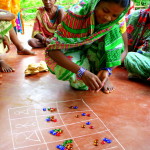The May 2015 issue of Agricultural Economics features articles on gender differences in sub-Saharan African agriculture. Papers are available here. This special issue contributes to the literature on gender differences in sub-Saharan African agriculture primarily by using new and innovative micro-data. The first six articles have a strong focus on understanding the extent and drivers of >> Read more
Event at Wilson Center on Pakistani Women’s Collective Action for Change
An Enduring Revolution: Pakistani Women’s Collective Action for Change The role of women in many developing countries has traditionally been understood as that of a passive receiver of repression or services. Fouzia Saeed’s research findings challenge this view. At this event, Dr. Saeed will share the outcome of her work during her time as the >> Read more
Webinar: Enhancing Nutrition and Food Security During the First 1000 Days through Gender-Sensitive Social and Behavioral Change
Enhancing Nutrition and Food Security During the First 1000 Days through Gender-Sensitive Social and Behavioral Change brought to you by the CORE Group SBC Working Group Details Tuesday, April 28, 2015, 10:00am - 11:00am, Eastern Location Adobe Connect Presenter Megan Ivankovich, Program Officer, WI-HER LLC Dr. Taroub Harb Faramand, President and Founder, WI-HER LLC >> Read more
Resources from CARE Measuring and Monitoring Gender Behavior Change event now available
On Thursday, April 16th at the Carnegie Endowment Conference Center in Washington DC, CARE’s Pathways team hosted a dissemination event to share our experience and expertise in Measuring and Monitoring gender behavior change in agricultural programs. Please visit their blog to read about the event and access the compiled list of materials referenced during the >> Read more
New Post on the PIM EnGendering Data Blog: “Yours, Mine, and Ours” by Agnes Quisumbing
Increasing evidence demonstrates the importance of women’s control and ownership of assets for achieving important development outcomes. Yet, studies focusing exclusively on increasing women’s asset ownership and control, or increasing their ownership of a specific kind of asset, run the risk of missing what else is happening within a household. Does the woman increase control >> Read more
Webinar: The Role of Increased Income and Women’s Empowerment on Nutrition
The Role of Increased Income and Women's Empowerment on Nutrition: A Review of Two Feed the Future Activities in Rwanda Hosted by USAID and SPRING Webinar April 30, 2015 | 9:00-10:30 a.m. EDT Agricultural livelihoods affect nutrition of individual household members through multiple pathways and interactions. This ultimately raises the question - how might these >> Read more
Debate: Economics or Politics: Which Drives Women’s Empowerment?
A debate hosted by the National Democratic Institute and Women, Business, and the Law (World Bank) Thursday, April 16, 2015 Room I 2-250, World Bank Group I Building, 1850 I St NW 11:30am-12:30pm RSVP Here Participants: Irene Khan (Economic Empowerment) is Director-General of the International Development Law Organization (IDLO). The first woman to hold this >> Read more
Debate on women’s access to finance (April 20, 4:30pm)
The IFC is hosting an interactive debate on women's access to finance. Ensuring access to capital for women is pivotal if we want to enable all to participate in the financial system--the goal of the 2020 Financial Inclusion agenda. Recipients of the IFC CEO Gender Award will also be recognized. Register here.
Panel Discussion: How can entrepreneurship empower poor women?
Vital Voices Global Partnership and American University Program on Gender Analysis in Economics (PGAE) are hosting a panel discussion on "How Can Entrepreneurship Empower Poor Women?" on April 15 at 12pm. Panelists Caren Grown, Senior Director, Gender, World Bank, Ritu Sharma, author of Teach a Woman to Fish and Principal, Sharma Solutions, and Marguerite Berger, Vice President >> Read more
Resources from CARE International on integrating gender into climate adaptation
CARE International has several useful resources on integrating gender in adaptation. These resources recognize that the relations between men, women, and youth affect people's capacity to adapt to the impacts of climate change. Check it out! Communique on Gender and community based adaptation (CBA) Joto Afrika issue 9 on CBA and Gender CCAFS / CARE >> Read more
- « Previous Page
- 1
- …
- 11
- 12
- 13
- 14
- 15
- …
- 74
- Next Page »



